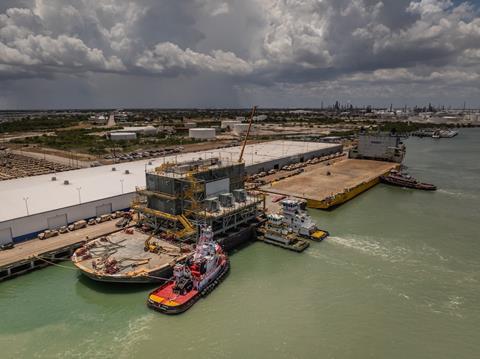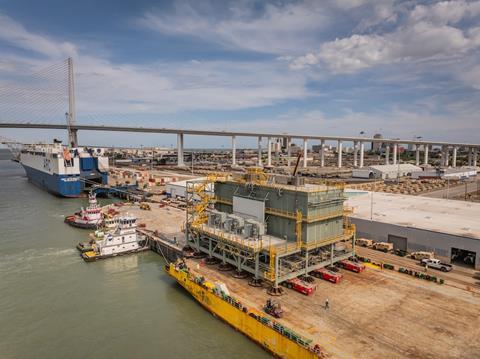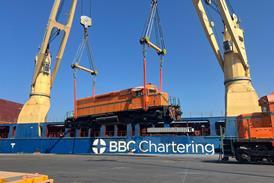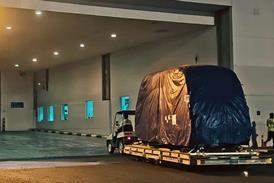Project forwarder deugro has delivered a 1,334-tonne module from Port Ingleside to the port of Corpus Christi in Texas in support of a major LNG project in Canada.

The project involved a collaboration with deugro Canada, deugro USA, and the team from dteq Transport Engineering Solutions. The module, measuring 38.3 m x 31.6 m x 21.3 m, was loaded onto a barge at Port Ingleside and transported to Corpus Christi where it was loaded onto a deck carrier for onward delivery to Canada.
To ensure a safe voyage to Corpus Christi, the barge had to be equipped with bespoke grillage. This was delivered to the Port Aransas terminal in Texas where it was installed onto the barge, which was then moved to Port Ingleside for loading. The module was subsequently rolled onto the barge and seafastened – a process that took approximately 115 hours.
In Corpus Christi, the seafastening was removed so that the module could be transferred from the barge directly onto the deck carrier using SPMTs, requiring meticulous transport and engineering. During the operations, four tugboats were used to simultaneously keep the barge and deck carrier in their required positions.

To ensure the safe transfer, dteq’s engineers verified and recalculated the initial seafastening plans. According to deugro, this led to reduced overall operation times and reduced costs. Franklin Alvarez, regional director transport engineering Americas at dteq USA, explained: “Our engineering team worked relentlessly to jump multiple hurdles, including those that arose at the last hour. Starting with the seafastening design of the module, dteq optimised the securement for barge transport, enabling a timely arrival for the transfer from barge to deck carrier.
“This was followed by further optimisation for the vessel itself, where dteq provided a revised seafastening plan that saved approximately 25 percent in time and material compared to the original plan. We provided full support to all teams involved and acted as a central connecting point to develop a hybrid mooring plan that considered both the vessel and the barge together, rather than analysing them independently, for the transfer operation at the port of Corpus Christi.”
Adding to the complexity, the planning and execution were completed under increased pressure by a restricted operational time window due to the presence of US military vessels docked at the same pier during the loading and seafastening activities. At one point, the arrival of an additional military vessel required the relocation of the deck carrier to Port Aransas where all seafastening was finalised, requiring the swift mobilisation of 27 welders to complete the works according to plan.
















